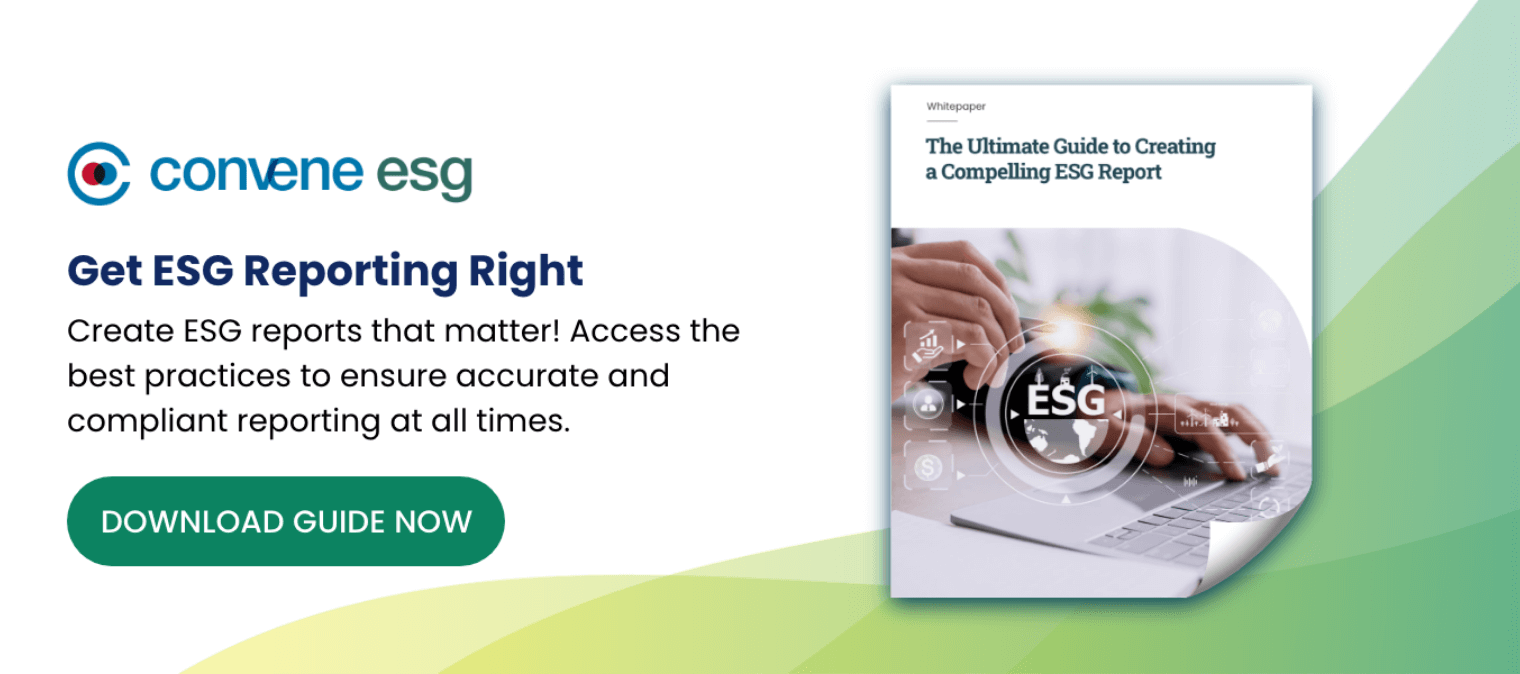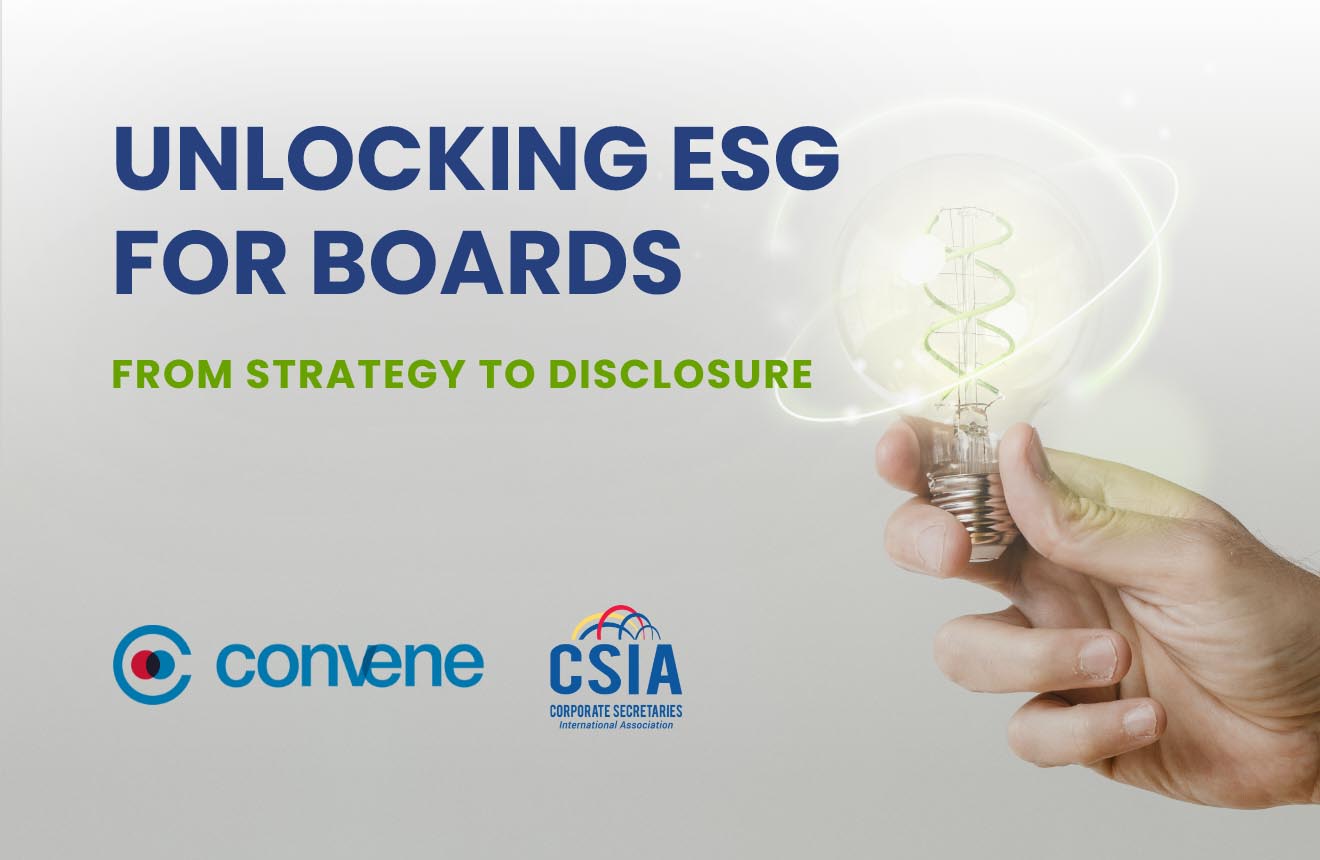Over the past few decades, investing has undergone significant changes, and so has the market surrounding it. Companies that will continue to thrive aren’t just those with strong balance sheets, but those built on strong values, meaningful impact, and adaptability. Whether finance, energy companies, or manufacturing firms, the pressure is to rethink how the business can be more responsible, forward-thinking, and sustainable.
This shift is influencing how capital flows and who gets it. Investors are now more focused, asking smarter questions, and seeking partners who can deliver more than just returns. This brings us to the sector with the ability and ownership to command these values at scale: private equity. Explore in this article the concept of sustainable investing and how private equity can participate in sustainability.
What is private equity?
Private equity (PE) is a kind of investment that plays the long game in high-stakes business building. Investors pool money to buy companies, help them grow, and eventually sell them for profit. This process often lasts ten years or more. These firms operate through a structure that includes:
- Limited Partners, the investors who provide the capital,
- General Partners, the private equity firm managing the fund or investments, and
- Portfolio Companies, the businesses being invested in.
Private equity firms usually target mature businesses that are established and need a little more push in a new direction or capital. Once firms acquire a large share, these companies are restructured, managed, and optimised with one goal: to boost their value.

What is the importance of ESG in private equity?
As the industry responds to evolving regulations and expectations around sustainability, ESG private equity funds play a larger role in how firms evaluate opportunities, guide portfolio companies, and boost long-term performance.
These are the key influences of ESG in private equity:
Investors want purpose alongside performance
Private equity backers are looking beyond profit alone. In 2024, 2.5 times more limited partners prioritised DPIs or distributed to paid-in capital than they did three years ago. The metric deals with how much capital a private equity fund has given back to its limited partners compared to their original investment. This shift points to a greater focus on clearer, measurable outcomes. ESG in private equity is crucial in that shift as partners lean more into investments that align with long-term impact.
Sustainability is fueling staying power
Private equity and sustainability are stepping up as major players in financing the transition to cleaner energy, as they are more open to adopting innovations and trends. This is driven by the growing demand for capital and flexibility in high-risk sectors, especially in energy sectors that are still in their early stages and subject to regulatory changes. With global clean energy investment reaching $1.8 trillion in 2023, experts say the figure needs to more than double by 2030 to stay on track for the net-zero goals of the Paris Agreement.
Capital is flowing where values align
Money is moving toward investments that align with values, and sustainability stands out in all this. As private equity funding dropped by 30% in 2024 compared to the previous year, more firms are exploring new sources of capital, like managed accounts and high-net-worth individuals. Investors are increasingly interested in opportunities that focus on ESG private capital. These changes are changing capital flows and raising the expectations for private equity sustainable investing.
Sustainability is an effective business strategy
With ESG moving into the core of how firms operate, stakeholders are also weaving ESG into everyday decisions. Investors are screening new deals, building value across portfolios, and using their voting and controlling stakes to push companies toward stronger ESG performance. This is because they recognise the rising demand for ESG in private markets, and people are willing to pay premiums for sustainable and well-governed companies. As the market evolves, those leading the way in sustainability are also leading in long-term value, attracting capital and investments, potential talent, and opportunities.
What is sustainable investing?
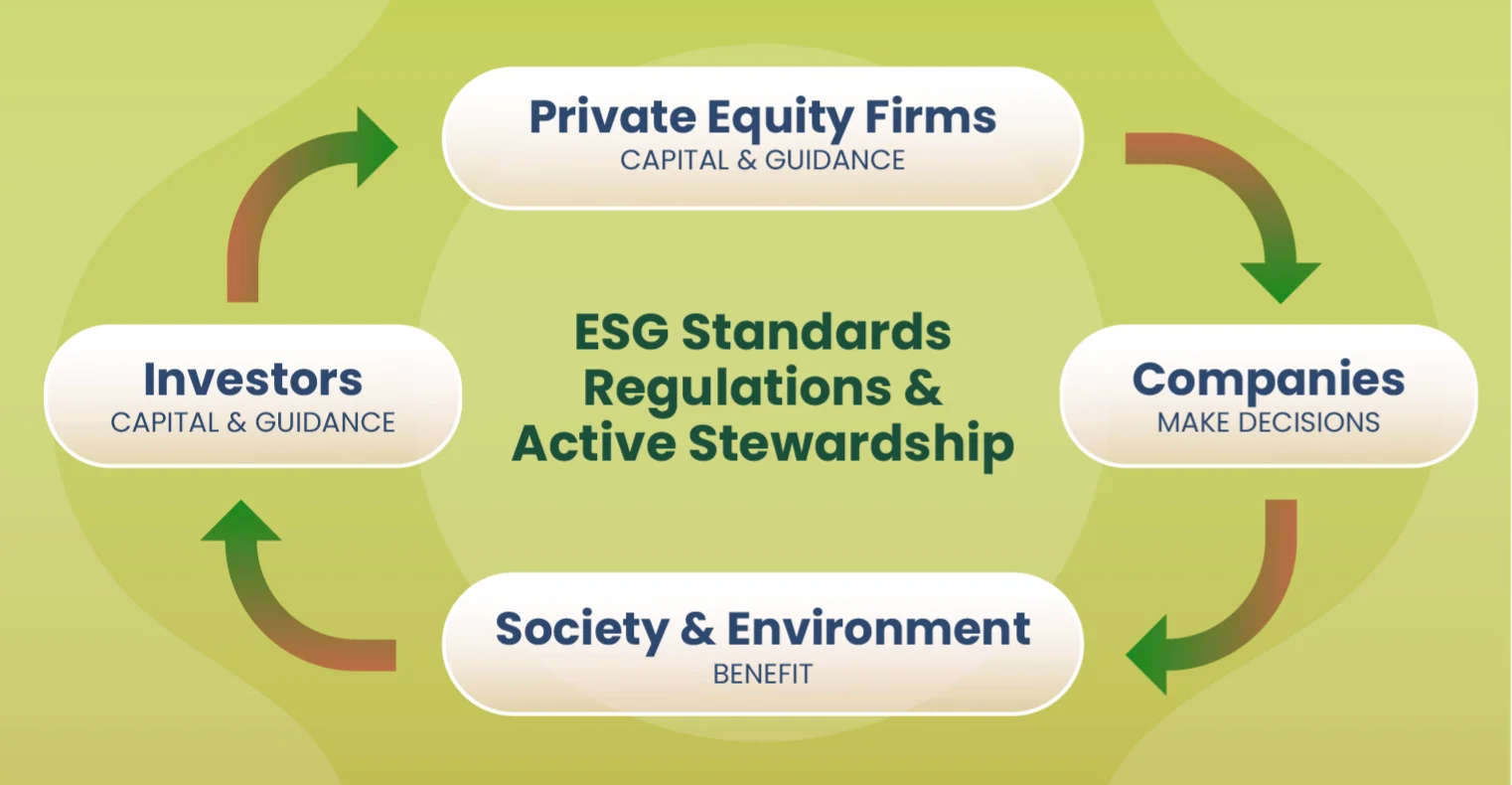
Sustainable investing means directing capital and guidance into businesses that adhere to corporate responsibility while still being profitable. It focuses on companies that manage environmental, social, and governance (ESG) risks.
- Environment: Protecting the environment, such as reducing emissions, using clean energy, and managing waste responsibly.
- Social: Treating people fairly, upholding labour rights, and promoting diversity and inclusion for the well-being of stakeholders and the community.
- Governance: Maintaining transparency, accountable leadership, and ethical practices.
These factors balance risk while promoting value creation and accountability, aligning with the principles of private equity sustainable investing.
For investors, the objective is to generate solid financial returns while supporting companies that contribute positively to society and the environment. By integrating ESG considerations into investment decisions, they can reduce long-term risk exposure, uncover new growth opportunities, and encourage better corporate behaviour.
This approach benefits both parties, as investors gain more resilient and forward-looking portfolios, while companies also receive funding and guidance that can help them improve their ESG performance.
Because private equity investors often take an active role in influencing company outcomes, sustainable investing opens up even more potential for impact and long-term value. This naturally aligns with responsible ESG investing, where investors incorporate ESG principles directly into their investment decisions. Investors assess how a company’s ESG practices impact its financial health and success.
By incorporating ESG into private equity strategy, firms can boost their financial and non-financial results, prioritising companies with the most potential to improve through ESG transformation. ESG investing not only benefits investors in returns but also supports sustainable business practices.
Which companies are prioritised for ESG and private equity?
Private equity firms looking to integrate ESG factors should prioritise companies whose ESG improvements can create value. Sustainable private equity has long delivered strong returns by targeting businesses that are often overlooked or underperforming, typically those with untapped potential or inefficient management. By acquiring these companies and applying targeted ESG strategies to restructure and optimise them, private equity firms can unlock value and earn high returns.
Incorporating ESG into strategic direction can build these companies better, especially in sectors facing sustainability pressures. Best targets include:
Underperformers with ESG gaps
Businesses with poor ESG ratings but strong fundamentals are ideal for ESG-led turnaround strategies. Improved energy efficiency, labour practices, and governance can help with cost savings and boost stakeholder value.
Spin-offs from public firms
Units carved out from large corporations often lack ESG maturity. They serve well with a repositioning or shift with sustainable operations and improved leadership.
Industries with transition potential
Energy, manufacturing, and agriculture firms can benefit from decarbonisation, transparency, and green innovations. These sectors are often eligible for regulatory or financial incentives tied to ESG performance and can benefit from compliance and risk management.
Consumer-driven businesses
Companies serving ESG-conscious consumers, such as those in the food, fashion, and retail sectors, can build brand value through sustainability-driven production lines and transparent governance.
Tech-enabled ESG solutions
Firms offering clean technology, ESG software, or compliance tools are valuable in encouraging sustainable transitions across industries.
How can private equity firms support portfolio companies in ESG?
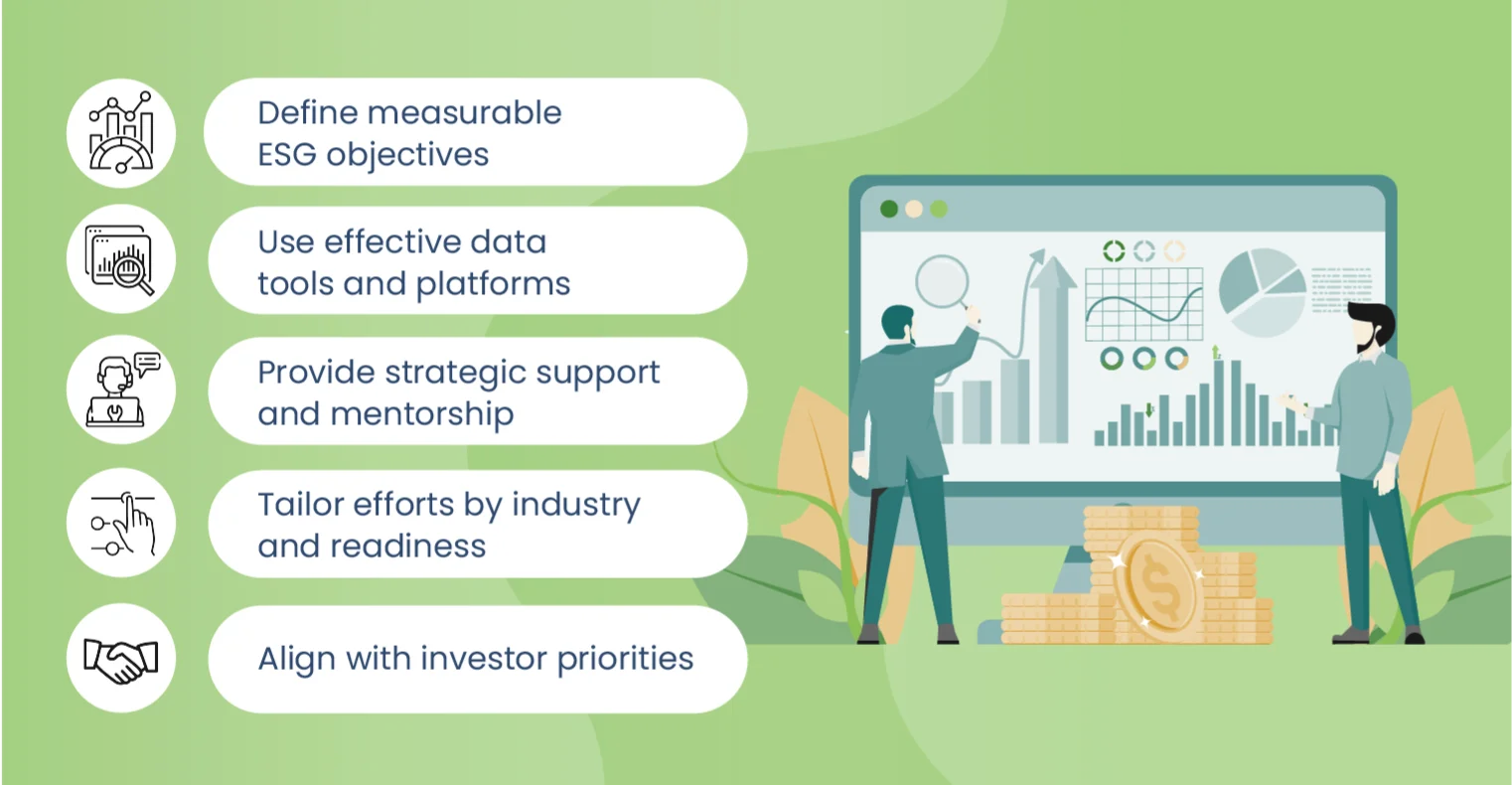
To make ESG in private equity work, private equity firms need to actively guide and equip their portfolio companies. This means more than setting policies; it requires setting realistic targets, improving data systems, and embedding ESG thinking into company culture. Tailoring strategies to industry-specific risks and capabilities also leads to more effective adoption.
- Define measurable ESG objectives: Private equity fund managers should work with management teams to set clear goals that align with both the firm’s ESG strategies and company-specific risks. Measurable targets allow for benchmarking progress and proving value to investors and stakeholders.
- Use effective data tools and platforms: Technology for ESG reporting, like Convene ESG, helps firms automate and simplify data collection and analysis, aligning with global standards and ESG metrics. These tools reduce manual reporting burdens and enable consistent tracking of metrics across the portfolio.
- Provide strategic support and mentorship: Fund managers must offer ongoing support. This includes access to experts, training sessions, and best-practice sharing across the portfolio to accelerate ESG maturity. Strategic consultations to address ESG challenges and tailor action plans aligned with company goals can help further ESG in portfolio companies.
- Tailor efforts by industry and readiness: Sectors like energy or manufacturing may require more environmental metrics, while financial services may need governance and diversity, equity, and inclusion, or DEI-focused actions. Start with companies ready to implement change quickly to demonstrate early wins.
- Align with investor priorities: ESG strategies should reflect investor expectations, especially in areas like diversity or climate change. Limited partners use ESG criteria to screen and evaluate funds, so alignment can directly affect capital raising and fund performance.
How can private equity firms report on ESG goals?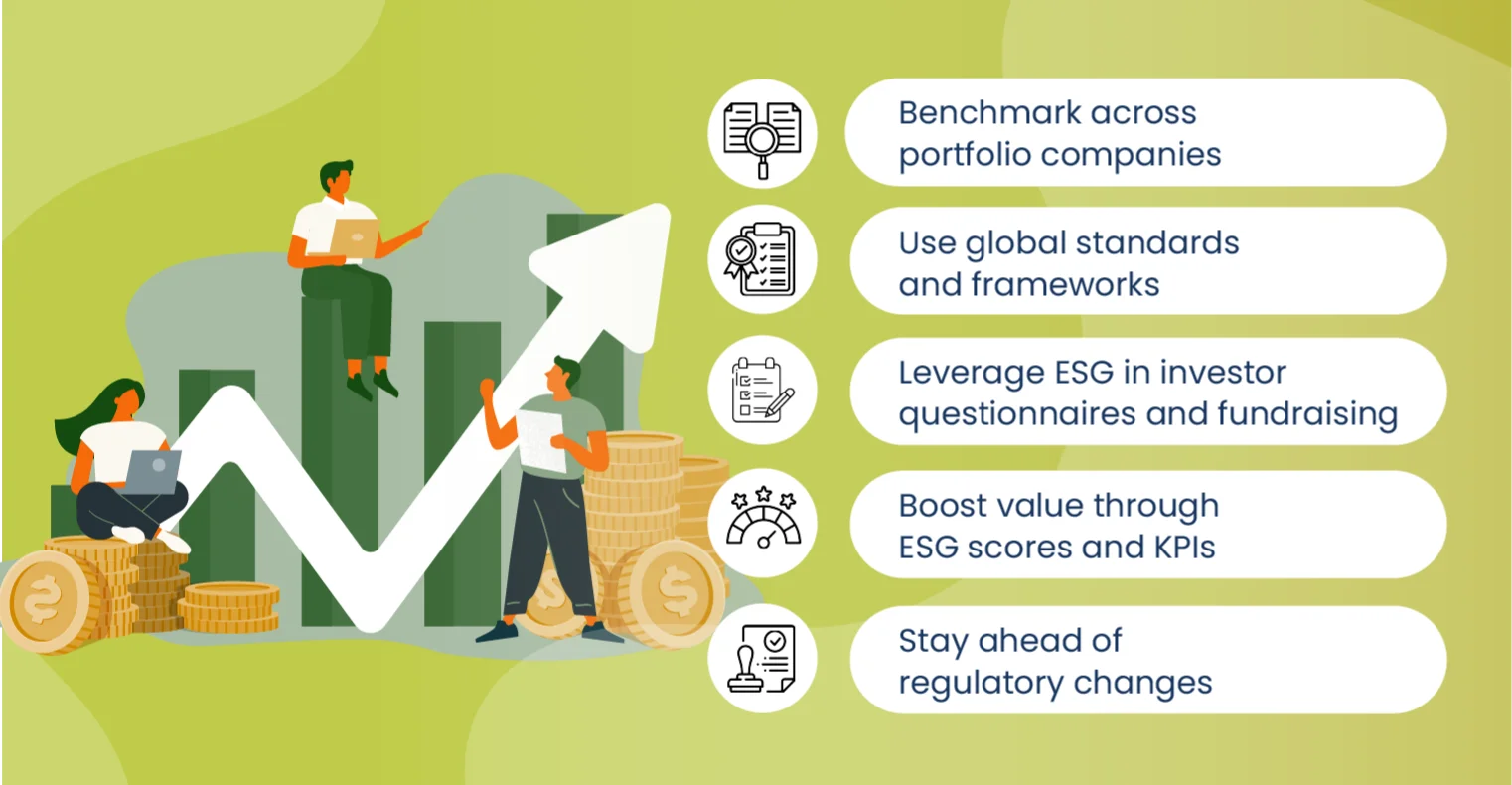
As ESG in private equity becomes central to investor expectations and regulatory compliance, reporting these also becomes more strategic for the long term. Firms must move beyond vague policies and adopt standardised, data-backed disclosure methods. Transparent reporting builds trust and helps fund managers differentiate in a competitive fundraising environment.
- Benchmark across portfolio companies: By consolidating ESG data, firms can benchmark performance, highlight top achievers, and identify areas needing improvement. This portfolio-wide view is critical for strategic planning and investor communications.
- Use global standards and frameworks: Align reporting with standards and frameworks like the International Financial Reporting Standards (IFRS) and the Institutional Limited Partners Association’s ESG roadmap. Standardisation builds transparency and consistency, reducing confusion and reporting fatigue across regions.
- Leverage ESG in investor questionnaires and fundraising: Fund managers should integrate ESG data into their investor fund documentation and Due Diligence Questionnaire (DDQ), which is a document investors send to private equity firms for fund investment decision-making.
- Boost value through ESG scores and KPIs: ESG scores that track performance indicators help internal teams and investors see the link between sustainability and financial performance. This also supports the identification of risks for significant investment decisions and increases credibility.
- Stay ahead of regulatory changes: Proactive firms regularly monitor upcoming policy shifts and adapt their reporting processes in advance. Staying constantly aligned with the latest regulation updates, such as the European Union’s Sustainable Finance Disclosure Regulation (SFDR) for PE firms and the Corporate Sustainability Reporting Directive (CSRD) for portfolio companies, helps avoid compliance risks. Early action also guarantees readiness and signals to investors and regulators that the firm or organisation is ESG-savvy and forward-thinking.
ESG and Private Equity Company Examples
Private equity firms are utilising ESG at a strategic level for long-term value. These two companies stand out as leading examples of how major players are blending and disclosing their ESG in investment approaches, operations, and client offerings to stay ahead in the market landscape.
Blackstone
One of the world’s largest private equity firms integrated ESG into its investment approach by targeting businesses that accelerate decarbonisation and energy innovation. Through its energy transition platform, the firm invests across infrastructure, technology, and services to support the global shift to cleaner, more reliable energy systems.
J.P. Morgan
While best known for its global banking footprint, the company operates as a major player in private equity and investment services, with a strong ESG focus. Through dedicated units like its Center for Carbon Transition and Green Economy Banking, the firm supports clients in financing climate solutions, scaling clean technologies, and navigating the risks and opportunities of the low-carbon economy.
Make ESG a Core Driver in Private Equity with Convene ESG
Success in private equity sustainable investing today requires showing how investments perform on ESG metrics. Convene ESG makes that process easier. Built for private equity firms and portfolio companies, our ESG reporting software is designed to help collect, track, and report ESG data that aligns with global frameworks like the IFRS and CSRD. With automated data capture, customisable templates, and real-time dashboards, it supports every stage of the investment lifecycle, from screening deals to reporting to investors. Whether you’re screening deals or updating investors, Convene ESG provides visibility and equips teams with the tools to adapt, meet stakeholder expectations, and raise capital with confidence.
Get started today! Book a demo and see how Convene ESG can support your ESG goals from strategy to reporting.
Pat is a Content Writer, focusing on informative and purposeful content for Convene ESG. She has written for sustainable living and art exhibitions, and took part in research and communication projects linked to the UN's Sustainable Development Goals, further diving her into sustainability and ESG values. Outside of marketing and content, she explores new subjects in film, drawing, and occasional overthinking.

